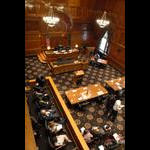Congratulations to the Winners of the Jenkins Competition
 The finale of this year’s Jenkins Moot Court Competition took place this evening, in the spectacular ceremonial courtroom of the Federal Courthouse.
The finale of this year’s Jenkins Moot Court Competition took place this evening, in the spectacular ceremonial courtroom of the Federal Courthouse.
Each of the four competitors who advanced from the semifinals, Alyssa Dowse and Timothy Sheehey, and Jessica Farley and Brent Simerson, gave a terrific performance. The panel of judges (Judge Lynn S. Adelman presiding in his own courtroom; Wisconsin Supreme Court Justice Patience D. Roggensack; and North Carolina Court of Appeals Judge and Marquette alum James Wynn Jr.) was active in its questioning of both teams, but the advocates stood their ground at every turn. I would have had a very difficult time ranking the competitors, were I on that panel.
After the arguments were complete and the scores were calculated, the winners were the Petitioners, Alyssa Dowse and Timothy Sheehey. At the reception afterwards, in addition to recognizing the first- and second-place teams, Dean Kearney announced the other two prizes in the competition. This year’s Ramon A. Klitzke Prize for Best Oral Advocate went to Alyssa Dowse. Finally, the Franz Eschweiler Award for Best Brief was shared by teammates Joseph Brydges and Timothy Hassel.
Congratulations to the first-place and second-place teams, the Best Oral Advocate, and the team that wrote the Best Brief. Indeed, congratulations to all of the students who had the honor of participating in Jenkins. And many thanks to the moot court board and executive board members and the faculty, staff, and alumni of the law school who helped with the competition. As the Dean noted at the reception, it was especially gratifying to see so many alums of the moot court program at the argument this evening.

